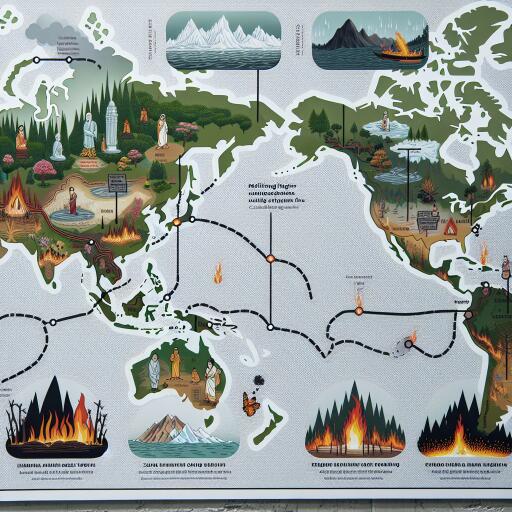
The Climate Threats on Pope Francis’ Asia-Pacific Itinerary
As Pope Francis sets off on his most extended foreign journey yet, a spotlight shines on the climate challenges of the Asia-Pacific nations on his travel roster. Over twelve days, the Pope will visit Indonesia, Papua New Guinea, East Timor, and Singapore, highlighting the urgent environmental issues these countries face.
Rising Sea Levels: A Looming Crisis
Pope Francis has often voiced concerns about the dramatic impact of rising sea levels, suggesting that many communities may need to relocate soon. Indonesia sees this prediction unfolding in real time, with its low-lying coastal areas—home to dense populations—facing severe risks from flooding and land subsidence. The country has taken the remarkable step of moving its capital from Jakarta to a new, safer location on Borneo.
Indonesia’s situation is dire, with projections indicating that around 115 of its islands could vanish beneath the waves by the century’s end. Similarly, Singapore anticipates a rise in coastal waters that could exceed one meter by 2100, straining its flood defenses and low-lying territories. The Pacific Ocean is witnessing sea levels rising at a pace surpassing the global average, a phenomenon that correlates with the increased severity of tropical storms across the western Pacific region.
The Threat of Unpredictable Rainfall
The Pope’s concerns extend to the increased frequency and intensity of rainfall, leading to devastating floods—a plight not unfamiliar to South East Asia and the Western Pacific. Papua New Guinea experienced a tragic demonstration with a landslide in May, burying over 2,000 individuals following severe storms and heavy rains. Similar patterns have inflicted casualties in Indonesia, with significant flooding events recorded in May and August.
East Timor faces challenges in building resilience against these natural disasters, having encountered its worst floods in five decades in 2021. The nation’s climate policy document to the U.N. outlines the precarious balancing act of managing extreme rainfall during the wet season and the heightened drought risks in the drier months, both of which threaten food and water security.
Singapore, facing its climate predicaments, anticipates nearly doubling rainfall during its monsoon season by century’s end in a worst-case climate scenario.
The Heat Is On
Referring to Earth’s condition as a “fever,” Pope Francis draws attention to the scorching heat affecting his itinerary’s destinations, with detrimental effects on health and regional economies. Singapore’s projections are particularly alarming, with anticipated temperature increases potentially normalizing days over 35 degrees Celsius (95 Fahrenheit) by 2100. Additionally, heightened ocean temperatures pose a direct threat to East Timor’s economy, endangering coral reefs and, consequently, the fishing industry that many locals depend on for their livelihood.
The journey of Pope Francis to these Asia-Pacific nations is not just a diplomatic or spiritual mission; it serves as a poignant reminder of the urgent need for global climate action. As these countries wrestle with the immediate impacts of climate change, their struggles highlight the interconnectedness of environmental issues and underscore the imperative for collective efforts to address a warming world.





Leave a Reply